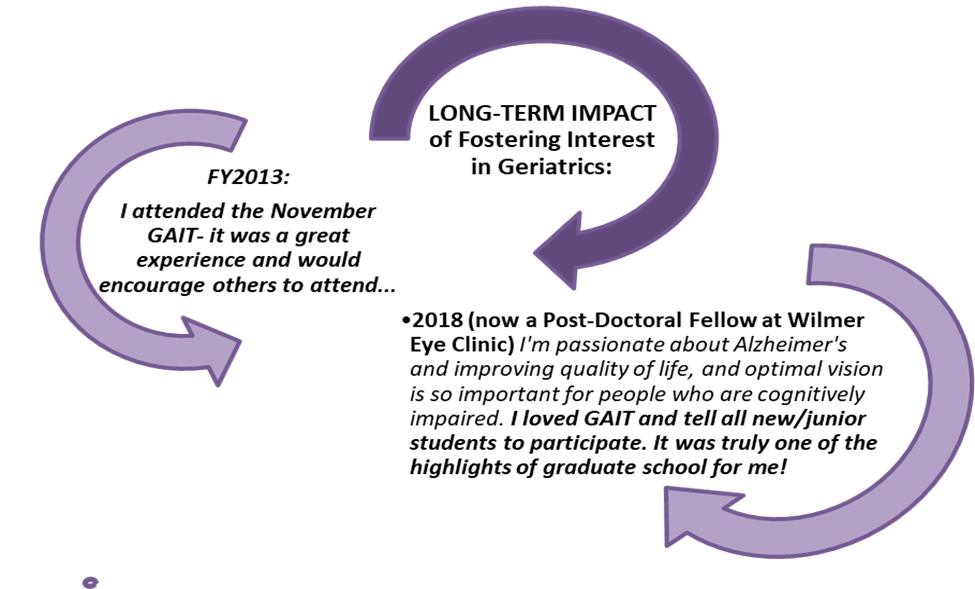GAIT introduces students to the needs of older adults living in medically underserved regions of Maryland and to the fundamentals of interprofessional (interdisciplinary) collaboration as they participate in didactic and clinical activities centered on the comprehensive geriatric assessment.

GAIT Project Overview: The Geriatric Assessment Interdisciplinary Team (GAIT) project is a free program for health and social science undergraduate, graduate, and professional degree-seeking students enrolled in a University System of Maryland* (USM) institution. GAIT is funded by the USM Redeployment Grant System. It is designed by the Maryland Area Health Education Centers (MAHECs) in partnership with the Geriatrics & Gerontology Education and Research (GGEAR) Program at the University of Maryland, Baltimore Graduate School.
The GAIT project provides an opportunity for students to:
-
Interact with students and professionals from a variety of health and social science disciplines;
-
Participate in team-building exercises that focus on the value of an interdisciplinary approach to improve quality of care for older adults;
-
Interact with older adults and professionals at sites such as adult day services, long-term care communities, or hospitals;
-
Understand services provided to older adults;
-
Learn about the needs of older adult living in medically underserved regions of our state; and
-
Create and present a person-centered geriatric assessment and intervention plan as a member of a care team.
As an interprofessional learning experience, GAIT is designed to help students:
-
Enhance interdisciplinary healthcare skills
-
Understand the uniqueness of interprofessional teams and its value in providing person-centered care;
-
Recognize barriers to effective communication in health care teams and identify ways to reduce conflict and disagreement;
-
Explain aging processes and the diversity of the older adult population;
-
Evaluate best practices in honoring the autonomy of older persons; and
-
Employ effective intergenerational communication skills (verbal, non-verbal, written) to engage with professionals and older adults.
GAIT Locations: Students select a GAIT project from an approved list of locations in Western Maryland, on the Eastern Shore of Maryland, and in the Baltimore metro area. A minimum of 10 GAITs are scheduled each academic year. Sites include adult day centers, assisted living communities, medical and rehabilitation hospitals, hospice and palliative care settings, independent living and long-term care communities, and skilled nursing homes. Approved sites share our vision and commitment to interprofessional collaboration in their efforts provide the highest quality care to vulnerable older adults.
GAIT Activities: Students are assigned to an interprofessional health care team and engage in activities designed to strengthen interprofessional and intergenerational communication skills, increase empathy toward older adults, and expand understanding of the value of the interdisciplinary approach to geriatric care. Programs are designed to be completed in 8-12 hours on-site over a period of one (1) to two (2) days (length of time of determined by the site). During this time, participants will engage in activities that include:
-
Tour of GAIT site to learn about services provided and clients served;
-
Age simulation activities to learn about normal age-related changes and their impact;
-
Review of patient/client record (each team is assigned a different person);
-
Team observation and interview of assigned client;
-
Team discussion of observations and interview followed by development of client Assessment and Intervention Plan (‘Plan’) based on components found in the Comprehensive Geriatric Assessment (able to consult with staff); and
-
Team presentation of ‘Plan’ to host site staff and other GAIT participants, followed by discussion
Please Note: For the safety of the vulnerable populations with whom our GAIT participants interact, the GAIT projects for Fall 2021 are virtual using the blackboard platform and Zoom conference technology. The virtual program is designed with the same mix of activities that normally take place on-site. It consists of both independent and live group activities. Total completion time is about 8-9 hours.
GAIT Eligibility and Costs: Health and social science undergraduate, graduate, and professional degree-seeking students enrolled at USM institution* are eligible to participate at no cost. All program expenses, including materials, meals, travel costs, and overnight accommodations {if needed} are covered by GGEAR. However, to effectively manage program expenses students are encouraged to carpool and are typically assigned two (2) per room (non co-ed), if accommodations are requested.
USM Institutions:
| Bowie State University | Coppin State University | Frostburg State University |
| Salisbury University | Towson University | University of Baltimore |
| University of Maryland, Baltimore | University of Maryland, Baltimore County | University of Maryland, College Park |
| University of Maryland Eastern Shore | University of Maryland, Global Campus |
* Degree-seeking students enrolled at Morgan State University are also eligible to participate at no cost.
Disciplines and Professional Programs**:
| Dentistry | Gerontology | Health Care Management |
| Health Education | Health Science/Pre-Health Professions | Human Ecology |
| Law | Medicine | Nursing |
| Occupational Therapy | Palliative Care | Pharmacy |
| Physician Assistant | Physical Therapy | Psychology |
| Recreation Therapy | Rehabilitation Science | Speech Language Pathology |
| Social Work | Audiology |
** Other interested students contact Diane Martin, PhD., GGEAR director, to determine eligibility
Interested in learning more? Download and view this GAIT presentation or contact us.
General Information: Dr. Diane Martin, 410-706-4327; diane.martin@umaryland.edu
Eastern Shore AHEC: Pam Allen, pallen@esahec.org
AHEC West: Joy Taylor, jtaylor@ahecwest.org
Central AHEC: Meredith Hochman, meredithhochman@centralmarylandahec.org


